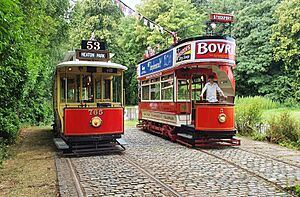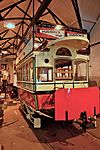Heaton Park Tramway facts for kids
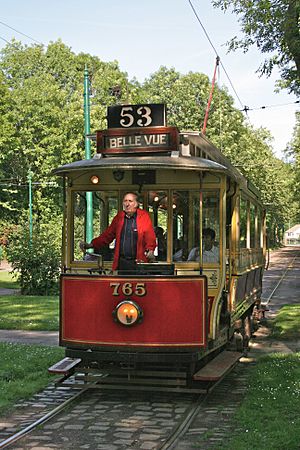
Tram number 765 in Heaton Park
|
|
| Operation | |
|---|---|
| Locale | Heaton Park, Manchester |
| Status | Open |
| Operator(s) | Manchester Transport Museum Society |
| Infrastructure | |
| Track gauge | 1,435 mm (4 ft 8 1⁄2 in) standard gauge |
| Statistics | |
| Route length | 0.52 Miles |
The Heaton Park Tramway is a special tram line located inside Heaton Park in Manchester, England. It's like a living museum where you can ride old trams! A group called the Manchester Transport Museum Society runs it. They are a charity that works to keep old transport history alive.
Usually, you can ride the trams on Sunday afternoons from March to mid-November. They also run on Saturday afternoons from May to mid-September. Sometimes, if there are big events in the park, the tramway might close for a bit. It was also closed for a while during the COVID-19 pandemic but is now open again.
Contents
History of the Heaton Park Tramway
Heaton Park used to be a private park around a big house called Heaton Hall. In 1902, Manchester City Council bought the park to open it to everyone. Soon after, a short tram line was built into the park. It connected to the main tram system on Middleton Road.
A large waiting area was built at the end of this tram line. The very first tram arrived there on May 31, 1903. By 1934, buses started to replace trams. The short tram line into the park was then disconnected. It was covered with tarmac so buses could use it instead.
How the Tramway Was Reopened
The Manchester Transport Museum Society (MTMS) started in the early 1960s. Their goal was to save old documents and items about public transport in the Manchester area. One of their first big projects was to fix up an old tram, Manchester Corporation Tramways 765. They hoped to run it in Manchester again. Heaton Park seemed like a good place for this.
In the 1970s, the society talked to the city council about their idea. Their first plan was to build a tramway from Grand Lodge to Heaton Hall. But this was too expensive because it needed work to cross a railway tunnel. So, they came up with a new plan. They decided to reopen the old tram line that went from Middleton Road to the old tram shelter.
The original track was hidden under the tarmac. Workers cleared this away and fixed up the old tram shelter. They changed it to be a place to store trams and a museum. All the work was finished in 1979. The Heaton Park Tramway officially opened on March 28, 1980.
Since 1980, the tramway has been made longer three times. They used old track from other places to do this. Now, the line is about 0.52 miles long. The newest part was added in 2011. It reaches the boathouse and the lake. A new tram storage building was also built at the end of this line. The original tram storage and museum building was also greatly improved in 2007.
Tramcars at Heaton Park
Permanent Collection of Trams
The Heaton Park Tramway has a collection of old trams that you can see and sometimes ride. Here are some of them:
| Images | Original System | Car Number | Status | Year Built | Notes |
|---|---|---|---|---|---|
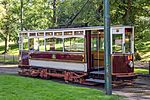 |
City of Hull Tramways | 96 | Operational | 1901 | This tram was built in 1901 for Hull. It started as an open-top double-decker. Later, it was changed into a single-deck work tram. After Hull's trams closed, it was used in Leeds. It came to Manchester and was fixed up as a passenger tram. It has been running at Heaton Park since 1988. |
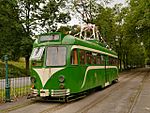 |
Blackpool Tramway | 623 | Operational | 1937 | This tram was built in 1937 for Blackpool. It was changed a few times over the years. It last ran in Blackpool in 2009. Then it was shown at a museum. It moved to Heaton Park in 2011 and has been running there since 2012. |
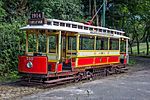 |
Manchester Corporation Tramways | 765 | Operational | 1914 | Built in 1914, this is the only electric tram from Manchester that still runs regularly. It was special because it was a single-deck tram with open sections at the ends. Many of these trams were sold in 1930. The body of tram 765 was found on a farm. The Manchester Tramway Museum Society started fixing it in 1960. It has been running at Heaton Park since 1979. |
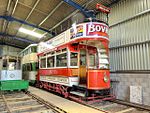 |
Stockport Corporation Tramways | 5 | Operational | 1901 | This tram was built in 1901 as an open-top tram. It later got a roof. It was taken out of service in 1948 and used as a chicken coop! The bottom part was found and saved. It was fully fixed up in 1996. After being used in Blackpool and shown in Doncaster, it came to Heaton Park in 2011. It ran until 2013. Stockport 5 had a big 7-year restoration and started running again in December 2020. |
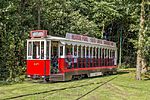 |
Blackpool Tramway | 619 | Operational | 1987 (1935) |
This tram is a copy of an old Blackpool and Fleetwood tram. It was built in 1987 using parts from an older tram from 1935. It ran in Blackpool until 2008. It came to Heaton Park in 2010. It ran until 2017 when it was taken out for a big check-up. It returned to service in December 2022. |
| Rawtenstall Corporation Tramways | 23 | In storage | 1912 | This is a single-deck tram built in 1912 for Rawtenstall. It stopped running in 1932. Parts of it were moved to Heaton Park in 2010. The tram is currently in pieces, waiting to be fixed up. | |
| Oldham Corporation Tramways | 43 | In storage | 1902 | This tram was built in 1902 as an open-top double-decker. In 1933, it was changed into a single-deck tram. The Manchester Transport Museum Society got it after it had been stored outside for over 60 years. It is in poor condition but can be fixed. | |
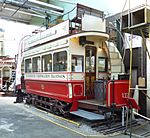 |
Manchester Corporation Tramways | 173 | Under Restoration | 1901 | This open-top double-deck tram was built in 1901. It was later rebuilt with a roof. It stayed in service until 1931 and was then used as a garden shed. It has been fixed up in different places. It moved to Heaton Park in December 2013. Work to make it run again started in 2024. |
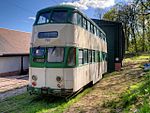 |
Blackpool Tramway | 702 | In storage | 1934 | This is a large double-decker tram from Blackpool. It started as an open-top tram in 1934. It was changed to a fully enclosed tram in 1942. It last ran in Blackpool in 2009. In 2010, it was shown at a museum. It moved to Heaton Park in 2014. |
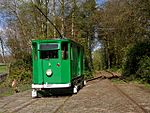 |
Blackpool Tramway | 752 | In storage | 1928 | This tram was built in Blackpool around 1928 to grind the rails smooth. It was originally number 1. The MTMS bought it in 2008. The plan is to paint it back to its original red color and change its number back to 1. |
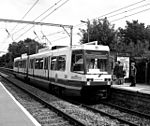 |
Manchester Metrolink | 1007 | In storage | 1991 | This tram is one of the first modern trams built for Manchester Metrolink in 1991. It was the first Metrolink tram to run through the city center on April 27, 1992. It stopped running on May 26, 2014. The tram is currently stored at Metrolink's Trafford Depot. It will move to Heaton Park later. |
| Manchester Carriage and Tramways Company | 53 | On loan to Bury Transport Museum | 1877 | This tram is the last one left of over 500 trams designed in 1877. They ran in and around Manchester until 1903. This tram was special because it could use the horses' power to turn the tram body around. This saved time because the horses didn't need to be unhitched and re-hitched. It also meant the tram needed only one staircase, making it lighter and able to carry more people.
The remains of tram L53 were found in 1970 near Glossop. It arrived at Heaton Park in June 1998. It was fully fixed up in 2008. Since 2010, it has been on display at the Bury Transport Museum. |
|
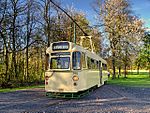 |
Blackpool Tramway | 680 | On loan to Blackpool Tramway | 1935 | This tram started running for Blackpool in 1935. It was changed in 1961 to be a towing tram. It last ran as a twin tram in 1972. It was taken out for repairs in 1989 and returned to service in 1992. It was loaned to another museum in 2013. It arrived at Heaton Park in March 2015. In August 2015, it was renumbered 680 and returned on loan to Blackpool Tramway. |
Former Trams at Heaton Park
Some trams that were once part of the Heaton Park collection have moved on:
| Original System | Car Number | Status | Year Built | Notes |
|---|---|---|---|---|
| Blackpool Tramway | 708 | Ownership transferred to Blackpool Transport in 2023 | 1934 | This double-decker tram from Blackpool started running in 1934. It was changed from an open-top to a closed tram in 1941. It last carried passengers in Blackpool in 2004. It left Blackpool in 2011 and was displayed at a museum. In 2016, it went back to Blackpool for storage. In 2023, its ownership was given to Blackpool Transport in exchange for spare parts to help keep Blackpool's trams running. |
Other Trams That Have Visited
Some other interesting trams have visited the Heaton Park line:
- Blackpool & Fleetwood No. 40 (a single-decker from 1914).
- Blackpool No. 225 Boat (an open-top tram from 1934).
- Oporto No. 196 (a single-decker from 1935).
- Marton Box No. 31 (an open-top tram from 1901, the first double-decker to run at the park since 1925).
- Blackpool No. 706 Balloon (an open-top tram from 1934).
Future Projects at the Tramway
The big repairs on Stockport 5 are now finished. The main focus for the tramway is now on Vanguard 619. Soon, they will start asking for donations to help make the Lakeside tram storage building bigger. This will create space for the T68 tram that is being saved to move to the tramway.
Future plans also include fixing up other old trams. These are Manchester Corporation Tramways open-top tram 173 (from 1901), Blackpool Balloon 702, Oldham 43 (from 1902), and the Blackpool railgrinder No. 752. There are also ideas to make the tramway even longer, reaching closer to the Heaton Park Metrolink stop.


